'If we see a bear, we will keep riding - as fast as possible': Riding northern Italy's Doga route
Determined to extend the fair weather riding season, Emma Magnus headed to northern Italy to sample the 110km Doga route
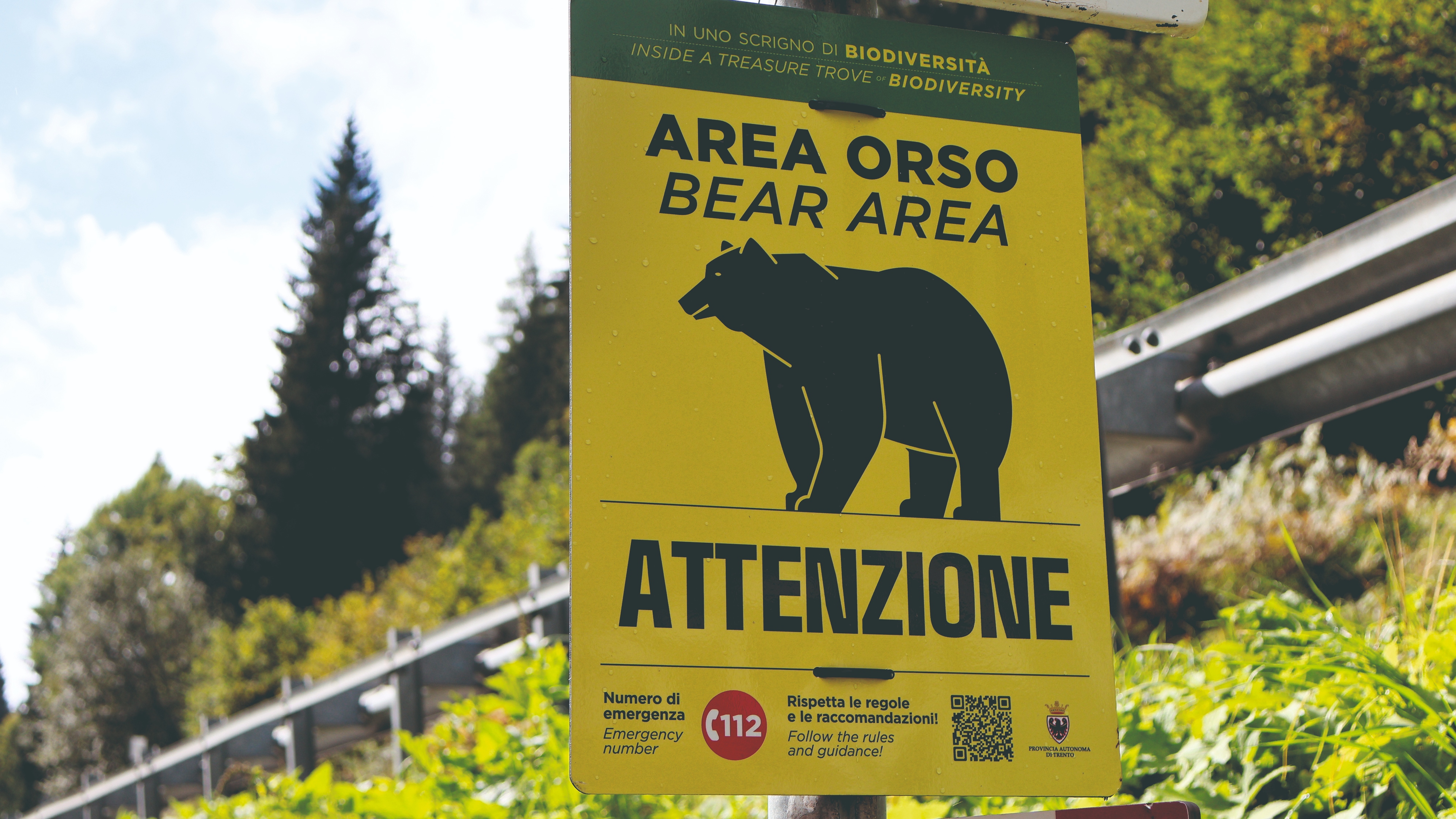
“This way,” our guide Giovanni Riccadonna pointed to a black, wooded track that wove steeply up from the side of the main road. It was hard to tell whether he was serious, because he’d been jokingly directing us up vertiginous walking paths and MTB trails all day. Now, though, it was 7pm, and the skies, heavy and dark, had opened. We were supposed to have arrived at our accommodation four hours ago. Thirty kilometres earlier, as the light had begun to soften, we’d stopped at a viewpoint where a waterfall thundered down to the river below. “Ten kilometres more,” Giovanni had told us. “Plus or minus.”
I’d come to Trentino in northern Italy to ride the Doga alpine cycling route, a 110km course from the foreboding Brenta Dolomites to the shores of Lake Garda. Opened in 2019, the route is designed to take cyclists through the backroads of wild Trentino, to showcase more of the region’s treasures beyond its two crown jewels. In late September, I was looking to prolong the cycling season before retiring my bike for the winter. While Europe’s highest mountains had already gained their first dustings of snow, Trentino, with its warmer microclimate, promised brooding Dolomites, pine forests and empty roads.
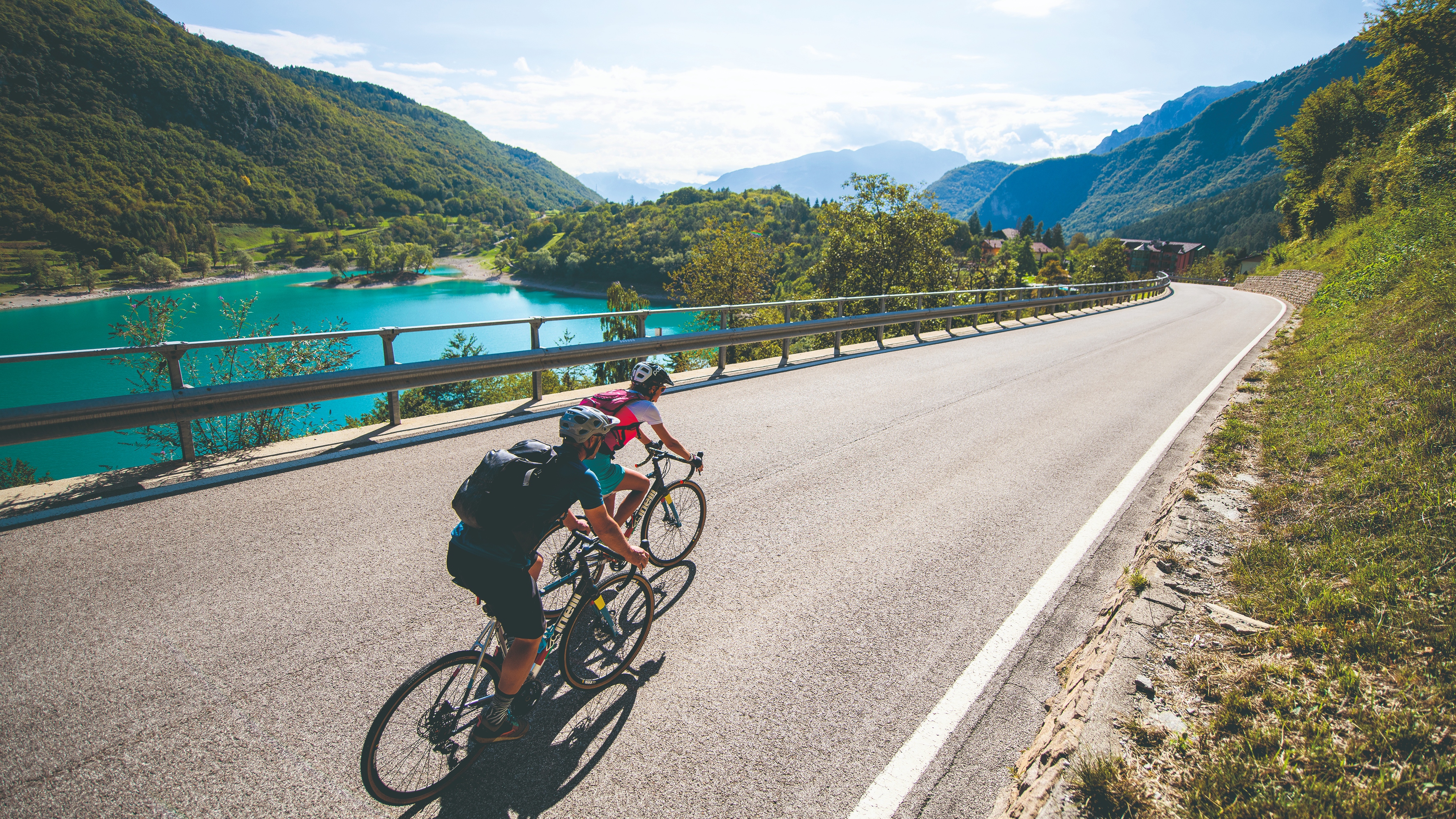
Roadside lakes beckon the eyes to feast on a turquoise delight
Although the Stelvio and Tuscan hills are more popular with British riders, Trentino is hallowed cycling ground. Home to the Tour of the Alps, its tough Alpine climbs often appear in the Giro d’Italia. Marco Pantani famously won a stage at Madonna di Campiglio in 1999, before failing a blood doping test and being disqualified. Professional cyclists Francesco Moser, Gilberto Simoni, Gianni Moscon, Matteo Trentin and Daniel Oss all cut their teeth on these rugged roads. “The area never ceases to amaze me,” said Oss in an interview. “The animals and plants around here are unique. If I’m out riding really early, often I see deer.”
Oss was not exaggerating. We started our ride from Malé, a town in Val di Sole, and quickly spotted a deer in the valley. We’d opted to ride the Doga trail in two days, frontloading the first with 90km. It was raining heavily, so we’d delayed our departure by half an hour. Our guide Giovanni was a 21-year-old ex-professional biathlete and co-owner of local bike shop CM Emporium. “It will stop,” he promised, looking skyward.
Bear necessities
Our main challenge was a 25km ascent, passing through Madonna di Campiglio to a refuge at 1,750m. As we turned onto the climb, the sun made its first appearance, spangling through the fir trees and twinkling on the wet road. So far, so sedate. But almost 10km in, we reached a turning point. We’d opted to take a gravel detour, looping into the forest. Marking the start of the trail was an unmistakable yellow sign: “Bear area: attenzione.” We paused. “If we see a bear, we will keep riding,” Giovanni advised. “As fast as possible.”
The gravel began with a sharp descent but soon began to wind steeply uphill. With ramps of almost 20% and loose, wet gravel, this was no joke: I had to stamp on the pedals to keep moving forwards, snatching moments of recovery before the next incline. Despite the threat of bears, our group splintered. Time began to warp and stretch. I could hear my own labouring breath, the crunch of gravel, the caw-caw of birds. At each stop, I felt the coolness of the wet forest on my skin and savoured the smell of the soil and the fi rs. Occasionally, as if revealed by some magical hand, I caught glimpses, through the parting clouds, of the jagged grey peaks above us. I began to forget about the gradients.
When we emerged from the forest at a grassy plateau, we were late. Two donkeys eyed us reproachfully. Up here, preparations for the ski season were underway, with felled trees lying by the side of the track. Giovanni had shown us videos of the 3Tre ski World Cup nearby, full of crowds and thumping music. But today it was eerily quiet, almost otherworldly.
Get The Leadout Newsletter
The latest race content, interviews, features, reviews and expert buying guides, direct to your inbox!
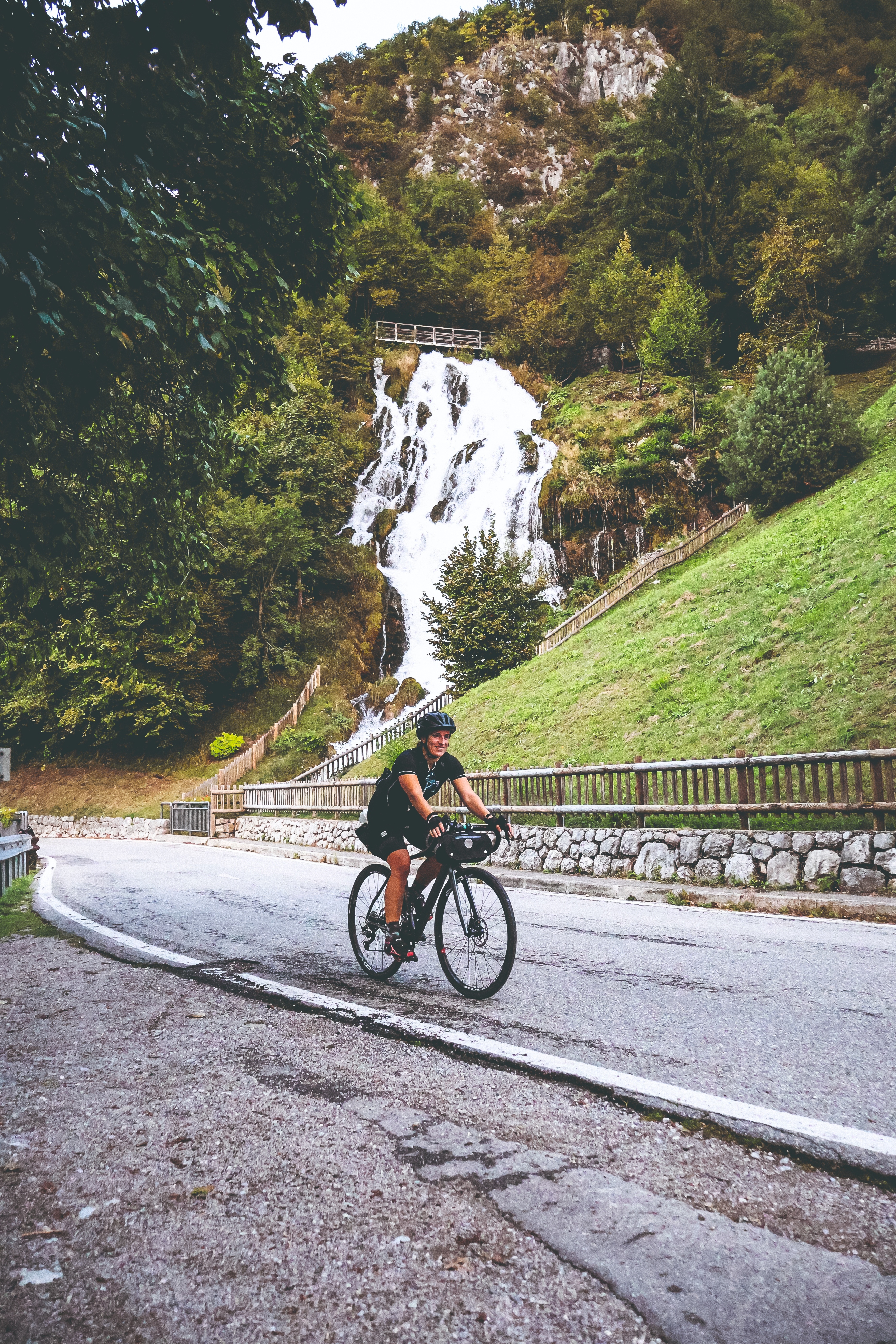
We were brought back to the real world at Rifugio Malga Ritorto, two kilometres up out of the deserted Madonna di Campiglio, where a warm welcome, a glass of Ferrari, the local sparkling wine, and a view of the Brenta Dolomites awaited us. Lunch, in true Italian style, was hearty: silky mushroom pappardelle for primi and a plate of polenta, vegetables and grilled cheese for secondi. In this warm, wood-beamed restaurant, it seemed almost obscene that we still had some 50km ahead of us.
After layering up, we passed back through ghostly Madonna, eyes streaming from the cool wind, before taking another gravel track down into Val Rendena. “We must make a paceline,” shouted Giovanni. A smooth bike path beside the fast-flowing, slate-blue Sarca river led us through Pinzolo. Soon we were climbing again, curving in a horseshoe around the neighbouring valley.
“There is Stenico Castle,” said Giovanni, gesturing to a frescoed 12th-century fortress. “There is Remco Evenepoel,” he nodded to a man in Quick-Step kit (blatantly not Remco Evenepoel) riding in the opposite direction. “And there is Rango, the most beautiful village in Italy.” Giovanni’s hometown pride, it transpired, was more than personal bias: Rango, celebrated for its stone porticos and Bleggio walnuts, has been ranked as one of Italy’s most beautiful villages since 2006.
It began to rain again on the last descent: fat, weighty drops that fell with increasing urgency. At the rough, wooded track, we blindly followed Giovanni to the village of Poia. In the slick darkness, our accommodation Agriturismo Casariga took on a magical quality. The grass-topped building is cut straight into the hillside, with seven serene timber-panelled rooms: it was time to get settled in for the night.
Pleasure is king
Our first day of the Doga trail had been an unwieldy, character-building adventure; our second was a sunny pleasure cruise with enough feasting to satisfy a Roman king. Because we’d arrived so late the night before, we’d been given a generous schedule: eight hours for 36km, most of which was downhill. Reader, we were still late.
We passed through quiet farm roads, cutting through the sundappled trees and over the lip of the valley. A heady descent brought us to a glittering Lake Tenno. Popular with swimmers in summer, the turquoise water is so clear that, from the cafe above, we could watch the fish as we enjoyed an Aperol Spritz. Five minutes after our break, it was time for lunch in Canale di Tenno, a rival to Rango in the village beauty contest, despite Giovanni’s protestations.
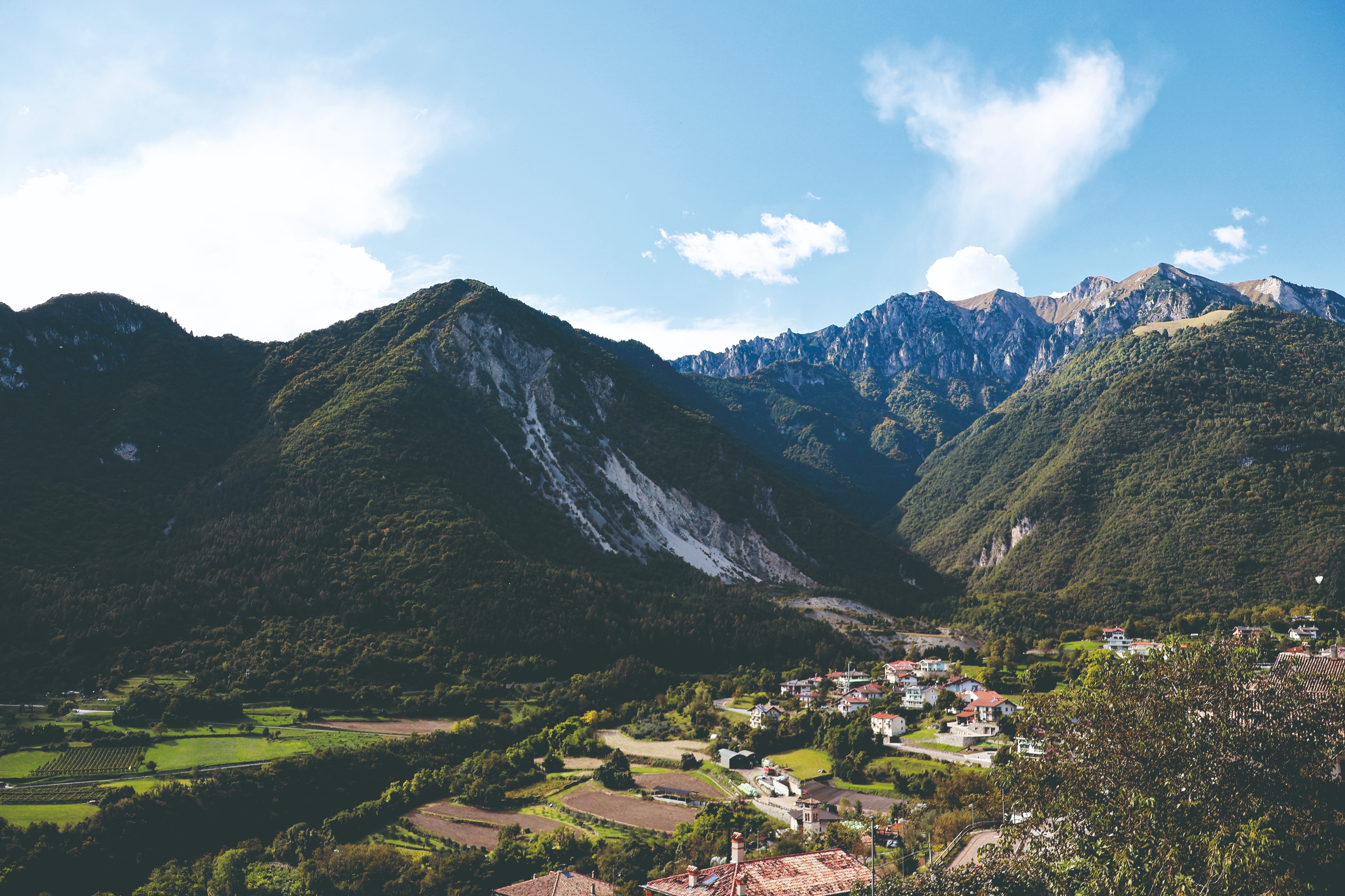
Canale di Tenno is stunning... just don’t tell Giovanni
Overlooking Lake Garda, the medieval village is famous for its barrelled archways and its Christmas markets, where local producers sell carne salada (cured meat dressed with olive oil) and fasoi (oil-seasoned beans) on the narrow streets. Drying corns and witchy wooden artwork hung suspended from villagers’ windows, with the squares bathed in late September sun. We ate lunch – plates of pasta, carne salada, sweet, roasted tomatoes and feather-light tiramisu – on Agritur Calvola’s sun trap terrace, looking out over the lake.
Our final stretch on the bike was a 600m hairpinned descent into Arco. Thanks to the thermal winds that sweep Lake Garda, the town enjoys a warmer, Mediterranean climate, extending the cycling season from April until October. Arco is an outdoor lover’s paradise, with streets lined with outdoor shops and cafes crammed with cyclists of all disciplines. Sitting among them, we raised a glass to our trip.
During the ride, Giovanni got good mileage out of pretending that unrideable tracks were part of our route. Actually, it’s a good analogy for how the Doga trail should be enjoyed: with time to stop, to explore – and to stray off course. This is a land of long lunches and of pausing mid-segment to look at waterfalls and lakes. In the ‘shoulder season’ – September to November, and March to May – expect varied weather and much debate about layers, but equally the privileged sense of snatching an adventure from winter’s grasp. Beyond Doga, there are Alpine climbs, rolling roads and lakeside routes aplenty. A cycling holiday here could take two days; it could take two weeks. Plus or minus.
Key information

How to get there
Milan’s two airports (three hours’ drive from Malé) are well-served by fl ights from the UK. We returned from Verona, which is an hour from Arco. Flights from London start from around £85 return. Bolzano airport, which has direct fl ights to London, is 1hr 15min from Arco.
Where to stay
In Malé, we stayed at Hotel Michela (hotelmichela.com), where prices start from £110 per night. Seven-room, family-run guesthouse Agriturismo B&B Casariga in Poia was our base for the second night (casariga.com). Prices start from £153 per night. In Arco, we stayed at outdoorholiday-makers’ favourite Hoody Active & Happiness Hotel (hoodyhotel.com). Prices start from £84 per night.
Bike rental
We rode gravel bikes hired from Skiarea Sport Shop (skiareasportshop.com), costing from €43 per day. There are almost 50 hire outfi ts nearby, listed on doga-cycling.it. Most of the route is tarmacked, but some of the quieter roads can be rough, so wider tyres (32mm and over) are recommended. Doga is also suitable for e-bikes, with 16 charging points on route.
The Doga route
The 110km route is spread across a mix of roads, cycle paths, gravel and strade bianche. There are two variants: one takes in the challenging Daone Pass, while the Dolce Vita version, which we rode, comprises a total of 129km, with 2,278m of climbing across the two days.

Thank you for reading 20 articles this month* Join now for unlimited access
Enjoy your first month for just £1 / $1 / €1
*Read 5 free articles per month without a subscription

Join now for unlimited access
Try first month for just £1 / $1 / €1
You must confirm your public display name before commenting
Please logout and then login again, you will then be prompted to enter your display name.
-
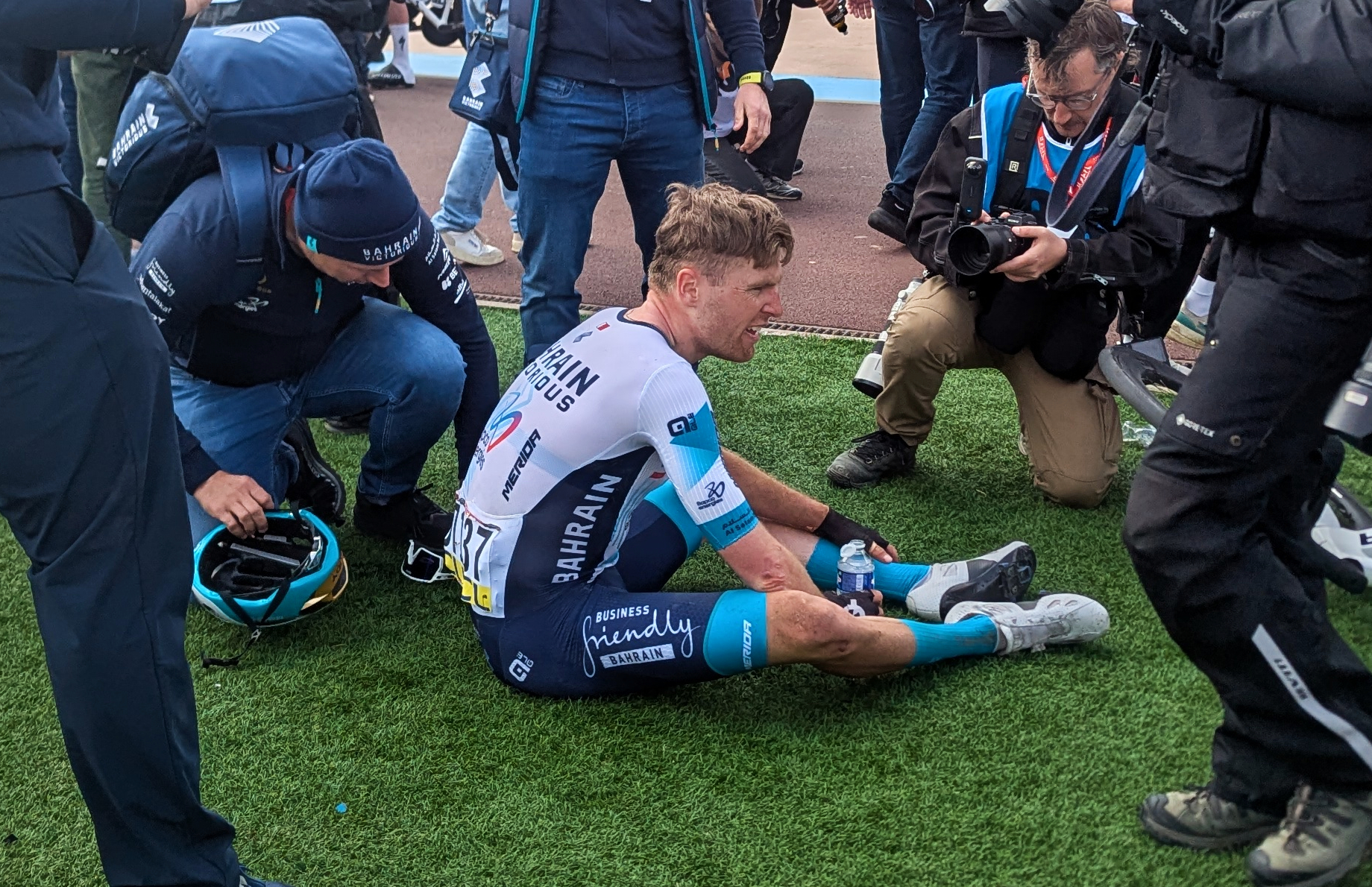 'I'll take a top 10, that's alright in the end' - Fred Wright finishes best of British at Paris-Roubaix
'I'll take a top 10, that's alright in the end' - Fred Wright finishes best of British at Paris-RoubaixBahrain-Victorious rider came back from a mechanical on the Arenberg to place ninth
By Adam Becket Published
-
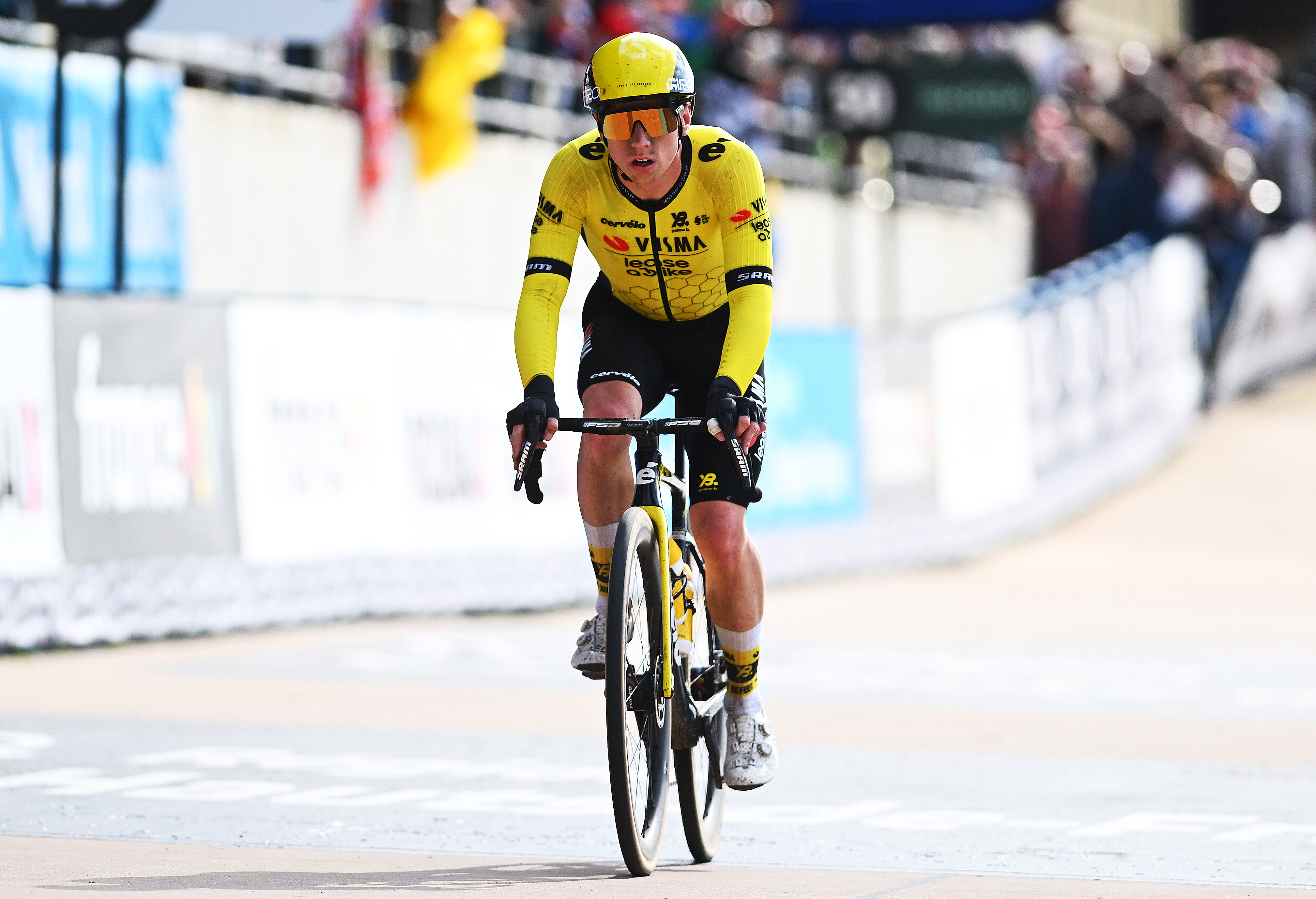 'This is the furthest ride I've actually ever done' - Matthew Brennan lights up Paris-Roubaix at 19 years old
'This is the furthest ride I've actually ever done' - Matthew Brennan lights up Paris-Roubaix at 19 years oldThe day's youngest rider reflects on 'killer' Monument debut
By Tom Davidson Published